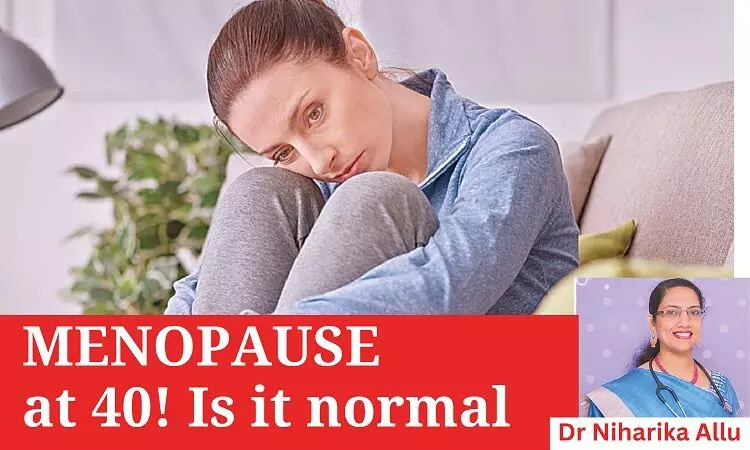Menopause at 40! is it normal

Haven't all of us, at some point, wished that our menstrual periods could stop so we could get rid of the period pain and the mood swings that come as part of the parcel? But what if it happens? Is it normal to have your periods completely stop at or before 40 years? Is it a blessing in disguise? Is it something to be glad for and feel no need for medical help?
The answer is a resounding NO to all the questions.
The female hormones produced by the ovaries, namely Estrogen and Progesterone, are essential for a woman's overall well-being of women. They are the reason why we are different from men. With the age of natural menopause nearing, the ovary gradually stops functioning and produces fewer of these female hormones. The biological age of menopause in Indian women is 47 years compared to 51 years in Western women. These hormones protect our hearts and bones and prevent heart attacks, fractures, and osteoporosis. They are also why we hear less about women succumbing to heart attacks than men. They keep us healthy and safe.
When menopause happens at or before 40 due to improper functioning of the ovaries, we call it POI-premature ovarian insufficiency in medical terms. There is a sudden fall in these hormones, and the woman experiences hot flushes, night sweats(vasomotor symptoms), mood swings, bone pains, sexual problems (pain during coitus, vaginal dryness), genitourinary problems (frequent urinary infections ), and also become more prone to heart attacks. Some women may not experience any of these, and only their periods gradually decrease over a few months and then stop altogether.
Irrespective of how it presents, these women need to be assessed by a gynecologist, the diagnosis of POI confirmed with blood tests and ultrasound, the cause evaluated, and they should be treated based on their symptoms and, if need be, given the replacement of these female hormones(HRT) till the natural age of menopause. All the scientific evidence till date supports the use of HRT in these young women who experience menopause early and advises that it is more beneficial when started early. Fertility in these women is almost nil, and women who experience POI and have not conceived yet, definitely need medical help.
The most common cause of early menopause is surgical. Hence, I urge women who have advised hysterectomy ( removal of the uterus ) for various reasons to interact with their gynecologist and make an informed decision about whether to get their ovaries removed or not along with the uterus. And women who undergo removal of ovaries before the natural age of menopause should be given HRT to protect their heart and bones and general well-being. However, studies show that women who do not take HRT when indicated have more chances of death than those treated with HRT.
Your health is your responsibility too .40 is not old anymore. It's the new 20. So follow these 10 rules for longevity and improved quality of life.
1 Be physically active - Min of 30 minutes of weight-bearing exercises daily.
2 Get exposure to sunlight often -It helps maintain Vitamin D in the body.
3 Eat a balanced diet- Take food rich in calcium.
4 Get good sleep- 8-10 hrs of uninterrupted sleep.
5 Annual physical exams- Breast, Pap smear, Thyroid, Cardiac evaluation, Diabetes, and High BP.
6 Visit your gynecologist for any sexual or urinary problems.
7 Maintain work-life balance.
8 Prioritise your mental health.
9 Invest in your hobbies.
10 Restrict or avoid smoking and alcohol intake.
Dr Niharika Allu is an MS(OBG), DNB, Consultant Obstetrician and Gynecologist, Birthright by Rainbow Hospitals, Visakhapatnam

